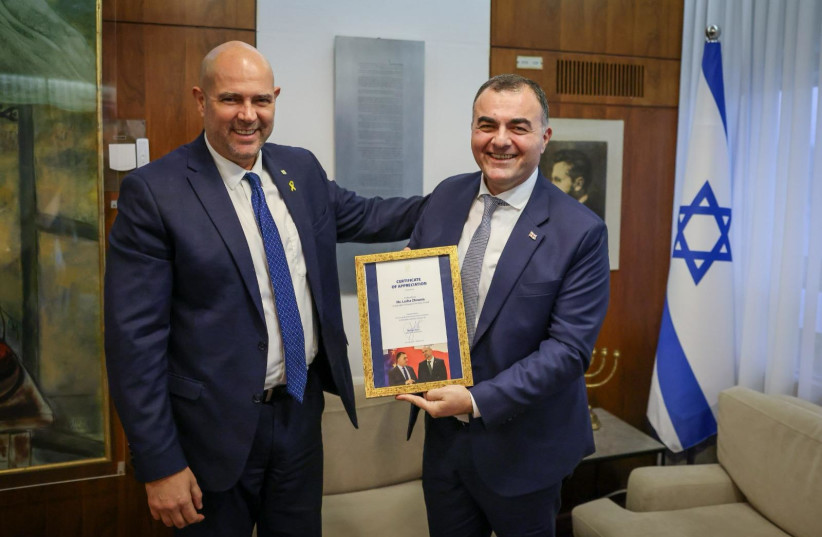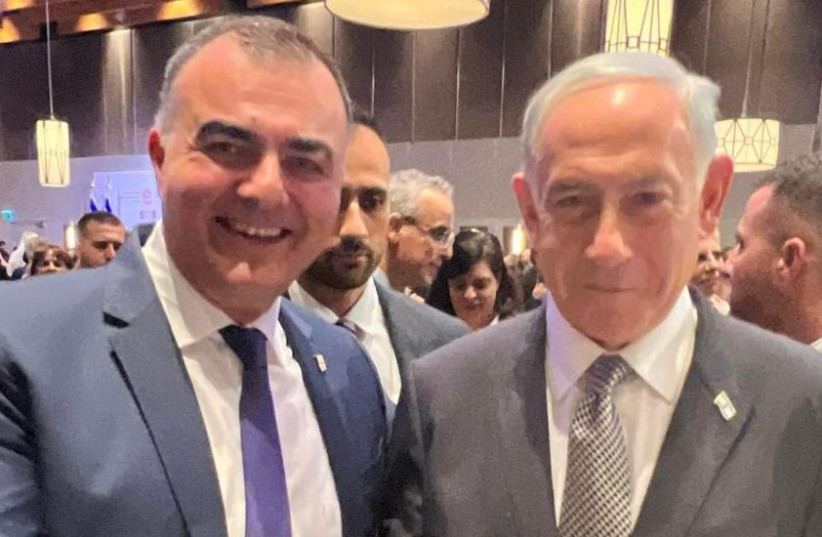Most people are unaware that Georgia has a centuries-old connection with the Holy Land, particularly Jerusalem.
Georgia’s premier poet Shota Rustaveli wrote the epic work The Knight in the Panther’s Skin as a gift for Queen Tamar of Georgia, who died in Jerusalem in 1220 and is buried at the Monastery of the Cross, which is one of the landmarks of the capital, close to the Israel Museum and the Knesset.
Georgian ambassador Lasha Zhvania, who completed his third term in Israel on January 31, knows more Georgian historical sites in Jerusalem, than do most native-born Jerusalemites, and has even led tours of Georgian Jerusalem, speaking as much from the Georgian perspective as from the Israeli one. He led these tours in fluent Hebrew.
While it is not unusual for a diplomat to serve twice in the same location, serving in the same place three times is extremely rare. The first time Zhvania received a posting in Israel was as Consul in 1998. He instantly fell in love with the country, and when his tenure concluded he was sad to leave and doubted that he would ever be sent to Israel again.
But in 2004, it was announced that he was the next ambassador-designate and he took up his appointment in 2005. When that appointment came to an end, he was even sadder to leave than before because he was convinced that he would never be sent to Israel again. But in 2019, he was back serving for a second time as ambassador. Doubting that he would be sent yet a fourth time, he decided to leave Georgia’s foreign service and remain in Jerusalem.

"When I'm in Tbilisi I dream of Jerusalem, and when I'm in Jerusalem I dream of Tbilisi."
He will return briefly to Tbilisi on February 4 to see relatives and friends and to tie up some loose ends, and will probably be back a few days later to join Jerusalem friends at a neighborhood restaurant where their “parliament” meets every Friday. In Hebrew usage, this is a tongue-in-cheek reference to a group of friends – mostly men but can be women – who meet regularly to discuss political events of the day, usually retirees and often those who had previously held significant positions. Ephraim, the genial owner, is a close personal friend.
“When I’m in Tbilisi I dream of Jerusalem, and when I’m in Jerusalem I dream of Tbilisi,” says Zhvania.
In a previous interview some years ago, Zhvania was asked whether – considering its long history with the city – Georgia would move its embassy to Jerusalem. At that time he was sure it would happen, but he couldn’t say when.
ASKED AGAIN in the course of this interview, he was still sure about it happening but again was unable to provide a time frame other than to say that the next time he enters the Georgian Embassy merely as a citizen of Georgia and not as his country’s ambassador, it will be in Jerusalem.
While still in office, he moved his official residence to Jerusalem, to the Malcha neighborhood, which was once the site of an ancient Georgian village, in the hope that this might hasten an embassy move to Jerusalem.
Not only that but in 2020, during the COVID-19 pandemic, he hosted a Georgian National Day reception in the plaza at the entrance of the Tower of David Museum. Aside from diplomatic guests, the Mayor of Jerusalem, and other dignitaries, the event was attended by a large number of Eastern Orthodox Georgians who live in the Old City of Jerusalem and are among the city’s ethnic minorities. They came wearing white T-shirts with large red crosses, representing the national flag of Georgia.
The YMCA, too, is a former Georgian site
Last year, Zhvania hosted a much larger national day reception receptions with Georgian singers and dancers at the YMCA in Jerusalem. Why the YMCA? Because it too is a former Georgian site. Close to a century ago, when excavations were conducted there, a grave was found with a tombstone inscription in Georgian.
As he can no longer remain at the ambassadorial residence in Malcha, Zhvania will have to find other accommodation. He hasn’t decided exactly where but says that it will be in one of the neighborhoods close to the Georgian community and lists Malcha, Katamon, and the area of the Monastery of the Cross as possibilities.
He is particularly appreciative of the decision by Mayor Moshe Lion and the Jerusalem City Council for agreeing to his proposal to name the valley around the Monastery of the Cross as Friendship Valley.
What will he do while living in Jerusalem?
He’s already had many offers of employment and is considering them. Among other things, he may act as a consultant on government affairs, though nothing related to Georgia. Given the diversity of his previous experience in different fields, he is well-equipped to act as a wide-ranging consultant.
He holds two Master of Law degrees from Georgian and British universities; he has been a diplomat, head of administration of the President of Georgia; chairman of the Foreign Affairs Committee of the Parliament of Georgia; minister for Economic Development; and continues to be the general-manager of the International Humanitarian Foundation. This is a joint Georgian-Azerbaijan initiative headed by Georgian Patriarch Ilia II who has a deep love and respect for the Jewish people, has visited Israel three times, and is known to tell his followers that a blessing from a Jew is like a blessing from God.

"Georgia is a safe place for Jews."
Looking back on what has been accomplished during his period as ambassador, Zhvania underscores that except for October 8, flights between Georgia and Israel continued as usual at least twice daily, and the planes were always full. He attributes this to the fact that while antisemitism is growing in so many countries of the world, in Georgia it doesn’t exist. “Georgia is a safe place for Jews.”
Not so long ago he says, the only place where one could get kosher food in Georgia was through Chabad. Now there are numerous kosher restaurants and even kosher hotels. He credits Chabad Rabbi Meir Kozlovsky with doing a tremendous job in Georgia in boosting Jewish life to the extent of opening a kindergarten and a school with so high a standard that it attracts non-Jewish children as students. Georgia is a wine country that has now begun producing kosher wine because so many Israelis and Jews from other countries visit, says Zhvania.
On an economic level, he is happy that during his ambassadorship Israel and Georgia signed a declaration of intent to enter into a Free Trade Agreement; are working together to promote tourism in both directions, and signed agreements for mutual assistance between the Justice Ministries of both countries. There have also been two prime ministerial visits from Georgia to Israel. Moreover, there has been a substantial increase in Israeli investments in Georgia.
As the general manager of the International Humanitarian Foundation, Zhvania is troubled by the ever-growing tense environment in the region and beyond. People seem to have forgotten about the importance of love, friendship, and devotion, he says, adding that these are the feelings that accompany Georgia’s relationship with Israel. He would like such sentiments to come back everywhere. He hears others express similar thoughts. “I hear them, but I don’t see them,” he says.
He wrote words to this effect on the recently published third Hebrew edition of Rustaveli’s epic that he presented to President Isaac Herzog and Knesset Speaker Amir Ohana as he ran around making his farewells during his final week as an ambassador.
